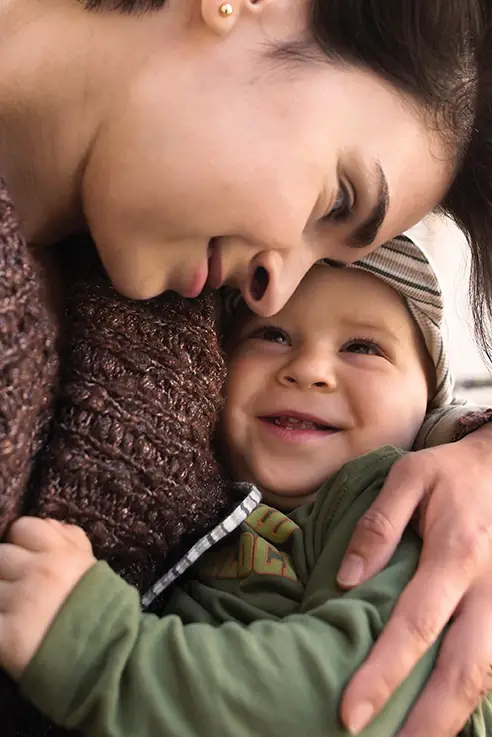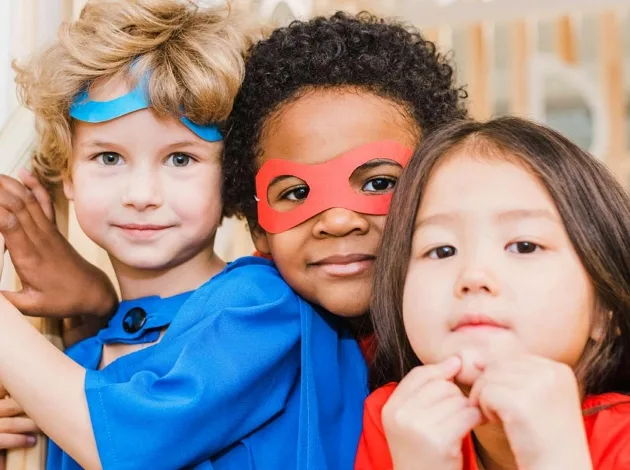Eleven parents of kids with special needs, all of whom have become experts in the special needs field, share the greatest wisdom they received that helped them cope after their children were diagnosed with disabilities.

1.
“I’m paraphrasing our psychologist from years ago when James was first diagnosed, but the best advice I ever got was basically ‘Treat the child, not the disability.’ Sounds simple, but it was really eye opening to me in the way I was approaching ‘the problem’ at the time. James’s disability is every bit a part of him as his eye color and blood type. There’s no changing around chromosomes. Treating his disability like something that can be fixed tells him that you think something is wrong with him. Helping him learn to live and even thrive with his disability shows him that you love and accept him for who he is, and will also get much better results as far as confidence and independence in the long run.”
Michaela Searfoorce has four exceptional children, ages 12, 4, 2, and 9 months. In addition to her blog, thefoorce.com, her work has been featured in Special Parent and Big Apple Parent magazines. Searfoorce and her husband recently moved from the UWS of Manhattan to Bay Ridge, Brooklyn to accommodate their ever-growing family.
2.
“Children with special gifts have special needs. Think about it: If your 6-year-old boy was a child prodigy on piano, wouldn’t you be going to special instructors, recitals, traveling to concerts? Same thing for a child sports star: You would be paying for special coaches, private lessons, clinics, travel teams, tournaments, uniforms, equipment, etc. Taylor Swift’s parents moved to Nashville to accommodate her passion and talent! How different is that from therapy sessions, special schools, private tutors, classes, therapies, diets, etc.? When I thought of it in that context, I didn’t feel as robbed—soon I realized that my time spent on my child’s “special need” is no different if my child’s needs were above or below the ‘norm.’ The key is early acceptance of your child’s talents so that you can help him learn to be the best he can be.”
Louise Weadock is a registered child psychiatric nurse, 30-year ASD/SID researcher including research at Johns Hopkins University, and founder of the 16,000-square-foot family gym WeeZee…World of “Yes I Can!” in Chappaqua, NY. Weadock recently launched an autism/sensory learning research nonprofit, Sensory Bullets.
3.
“Let him be a boy first.”
Diana Hamilton is a registered nurse who lives with her husband and two sons in Westchester. Her son Dylan was diagnosed with Tourette Syndrome at age 7. Read Diana’s post on the NYMetroParents blog.
4.
“Probably the best advice I ever got is: You have nothing to lose but time. The more intensive you can get at the earliest possible age the better. You have to listen to your gut; something I read years ago is: If the phone in your gut is ringing, you have to answer it. There’s always a piece of you that knows that your child has something going on, that you need to get an evaluation, that the therapist that you’re working with isn’t a great fit, that the doctor you’re working with doesn’t get it, and that little piece of you is not going to stop talking to you. And you have to listen to it. You may not know what to do next but you can’t ignore it because then you’re just going to end up in a situation where you’re tearing yourself to pieces ignoring something that another part of you is trying to tell you. I don’t want to boil it down to something as prosaic as trust your gut—it’s more just that you ignore your own true feelings at your peril. And that goes for giving yourself the support you need.
“Another really important thing that I was told many years ago is that you cannot ignore yourself. I feel that very strongly. If you don’t take care of yourself as the caretaker of a child with special needs, you’re going to end up paying for it and your child is going to end up paying for it. Not everyone has the money to go out and get mani/pedis, but you must prioritize yourself, you must care for your own soul. It’s ultimately to your child’s detriment if you don’t, because you will burn out and then your child is the one who will ultimately suffer. Caring for yourself could be something as simple as making plans to have coffee with a friend for five minutes. And yes, that may be hard. You may be with your child all day long and there may be no way for you to get away. But you must remember that you are a person. It’s very important for me to stress this because people say things like, ‘I can’t afford to do that’—not just money but time (‘I’m needed every second’). But you are not an inexhaustible resource. Eventually…there’s not going to be anything of you left. All parents could really use this advice: a break for the soul. They say ‘self care.’ It’s not selfishness, it’s not indulgence, it’s maintenance. It’s critical maintenance, just like you can’t expect your car to keep running if you don’t ever have it serviced.”
Sarah Birnbaum is a former editorial web producer with an MFA in writing who is now a special needs consultant and special education advisor. She lives in New York City with her husband and two children, one of whom has special needs.
5.
“Read Jim Sinclair’s ‘Don’t Mourn for Us.'”
Ariane Zurcher is a writer who lives in New York City with her husband and their two children, one who has autism and one who does not. Zurcher blogs about autism at Emma’s Hope Book. The article Zurcher refers to, “Don’t Mourn for Us,” is an overview of the presentation Sinclair gave at the 1993 International Conference on Autism in Toronto, addressed primarily to parents, published in the Autism Network International newsletter in 1993; read it at autreat.com/dont_mourn.html.
6.
“As a consultant to families that have children with special needs, I have shared much advice and learned a lot from my clients. Yet there is one concept that I always push to get across and that is: No matter what the diagnosis or need, you can never relinquish (consciously or unconsciously) your role as the parent. Don’t let the diagnosis overtake your ability to be effective nor rely exclusively on the advice of others in running your home.
“This can be difficult. When in the public eye, different disorders have different connotations. Each person has his or her own perspective and the media feeds into the perceptions. Parents encounter an overabundance of advice from society, experts, teachers, and family regarding discipline, education, intervention, feeding, etc., and too often their own voice or experience gets lost. I remember a parent once asking me if she could discipline her child. She was overwhelmed by the amount of expert advice and almost daily articles surrounding discipline and had simply done nothing. I counseled: You know your child the best and you know what you want for your family. That includes the values you hold dear regarding behavior, achievement, and relationships. Therefore, you must rely on these values to guide you in teaching appropriate social functioning to your children. My role as a consultant is to help you identify these values and come up with the strategies that will help you effectively implement them for use everywhere, but the values must be your own. What works for one family will not always work for another, and as long as you are not abusing your child and can utilize the majority of these strategies across environments, then you can create and follow through on an effective discipline plan for your child.
“It is this advice that my clients have found to be the most helpful, empowering, and supportive. Your family is your own. The diagnosis and needs only dictate the supports you need but it does not take away from your voice or responsibility to love, nurture, and raise your children to function at their fullest potential.”
Frederica McLean, M.Ed is a child and family development consultant specializing in behavior management at Living Above Disorder Consulting in Brooklyn. She provides special needs, education, and family development training and consulting in addition to at-home behavior and social skills intervention planning for families.
7.
“After my son was diagnosed, a friend warned me not to ‘disable him.’ At the time I did not understand what she meant. Now I realize: Having a child with special needs, it’s easy to fall into the habit of doing. You want to help them or you’re in a rush and you do the things they should learn to do for themselves. And sometimes you’re overprotective and scared to let go. As my son is getting older, I’m learning to let him do for himself. Even if it means waking up a few minutes earlier. And I’m learning to let go. It’s okay to let them fall; it’s part of growing up.“
Lisa Quinones-Fontanez writes the blog AutismWonderland.com, which chronicles her journey with her 7-year-old son Norrin, who has autism, and their adventures in the Bronx. She was featured as a “Homegrown Hero” in Special Parent magazine; read the article at nyspecialparent.com/hero-quinones.
8.
“After Josie received her diagnoses, we were told to trust our instincts. Josie is our child and we know her better than anyone else. We are the only experts on Josie. No one else, including her pediatrician, her therapists, or her teachers, knows Josie the way we do. Her father and I always respectfully listen and take into consideration what others have to say, but at the end of the day, we make the decisions regarding her care and education.
“Also, we were told that Josie is a person, not a diagnosis. She is the same baby we brought home from the hospital. There is no crystal ball. No one can predict what the future will be. We need to parent Josie the same way we parent our other seven children.”
Jennifer Swartvagher lives with her husband and eight children in the Hudson Valley. Her daughter, Josie, has been diagnosed with dyspraxia and hypotonia, and attends a special needs preschool. Swartvagher blogs at beyondthecrib.com.
9.
“The best advice I ever got was when I asked my daughter’s doctor, ‘What is her diagnosis?’ He looked at me with a smile and said, ‘That depends on why you are asking. If you are asking for insurance coding or school accommodations, the diagnosis is XYZ. But the reality is that with children it takes time to unravel, and I don’t treat a diagnosis, I treat the symptoms; we will treat the child, who will not to be defined by a label. Labels can bring limitations, and this child has no limitations.'”
Marianne Russo is a married mother of three daughters living on Long Island. She is the president and host of The Coffee Klatch Special Needs Talk Radio Networks, which brings parents a world of renowned experts, resources, support, and most of all, hope.
10.
“Love her for who she is.”
Jill Edelman, MSW, LCSW, of Redding, CT, is the mother of a grown daughter with special needs who blogs at ParentingAdultSpecialNeeds.com. She is also the author of This Crazy Quilt: Parenting Adult Special Needs One Day at a Time, dubbed “A must-read for parents of special needs children nearing adulthood” by Kirkus Reviews.
11.
“I am very thankful for the advice I received from a Birth to Three physical therapist. My daughter has a physical disability. When Kari was young, rather than watch her struggle to get a toy by herself, I would hand it to her. The therapist told me that I need to ‘sit on my hands’ and that ‘Kari will figure out how to get it on her own.’ As parents, we want to help our children. What I did not realize is that my actions communicated that I did not think that she was able to get it on her own. As Kari got older, when she struggled to learn a new skill like opening a door from her wheelchair, we would strategize together how she could do it by herself. Today, she is a very determined and independent 9-year-old with a great ‘can-do’ attitude. I am so appreciative of her physical therapists who challenged me to let her do it on her own.”
Karleen Craddock is the Southwest regional coordinator for the Connecticut Family Support Network, which provides family support and collaborates with state agencies and advocacy organizations on families’ behalf across six regions throughout Connecticut, including Fairfield County.















